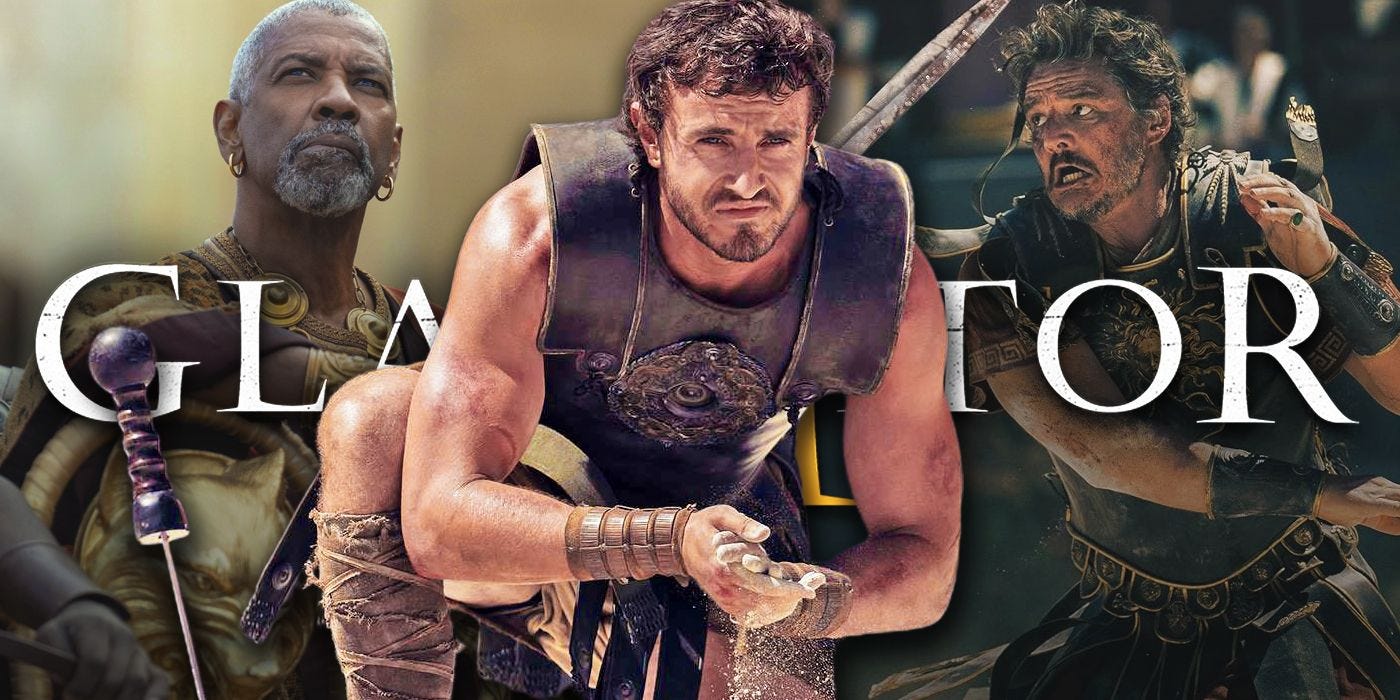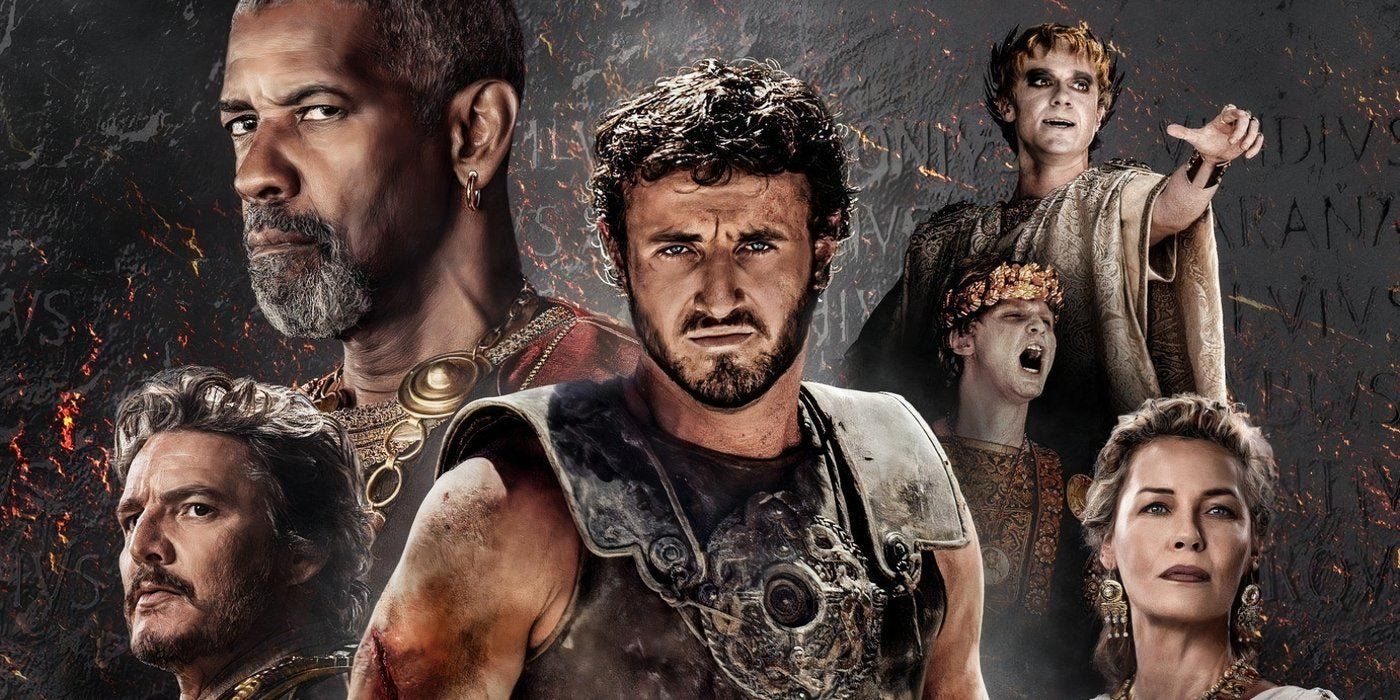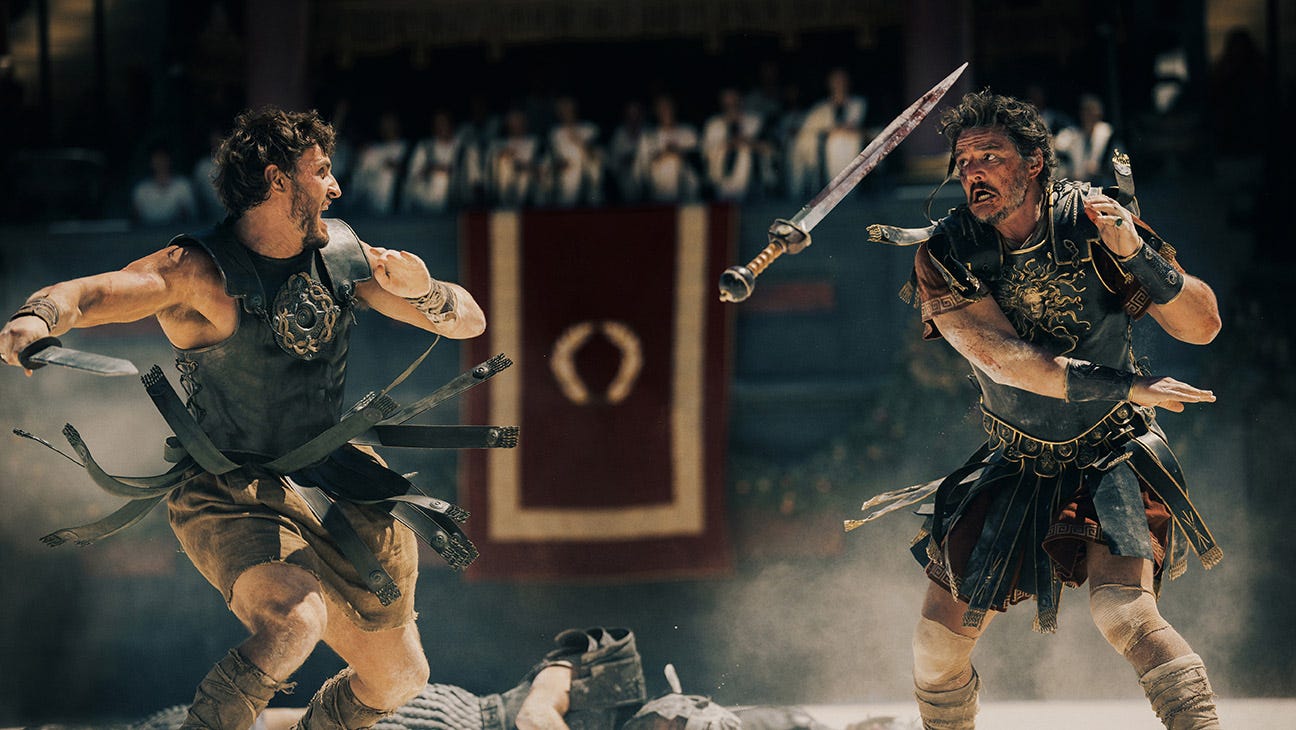We all know the cliche that those who do not die heroes will live to become villains. No man is infallible enough to endure the long test of time. He will falter eventually. Yet all men do die, and so some lucky ones are spared the indignity of indignity before they might have a chance to blunder away their reputations. Mortality could be a blessing in disguise, from the rearward gaze of future generations.
But what if a man never died? What if he lived forever, his putrefying cadaver still standing upright and making new blockbuster films year after year, decade after decade, century after century? He would surely become a villain; but then, if he survived long enough, if he lived forever, what else might happen to his legacy? His reputation?
Could he be a hero again? Could he salvage glory from the ruins of humiliation?
Ridley Scott intends to find out.
Exactly one year ago, Scott’s last film, the calamitous Napoleon (2023), was released. Napoleon speaks for itself. It is meritless and best left entombed beneath the Flavian Amphitheater. Now comes Gladiator II, a direct sequel to his legendary pseudo-historical epic Gladiator (2000) starring Russel Crowe.
That Scott can follow Napoleon up so quickly with yet another historical epic, at his advanced age, speaks to either remarkable industriousness or a shameless ability to slap his name on the directorial work of other filmmakers.
In either case, the trademarks of his filmmaking hold fast through the eons. The story of Gladiator II begins in Numidia with a young man, an out-of-place Roman wed to a young native. In this version of history, Numidia is a single city, rather than a large geographical area, and it is being invaded by the Romans via sea, even though it should have been an important province for about the last two centuries by the time this story takes place.
You can guess what follows. The young man’s bride is slammed into a refrigerator (thankfully) while he is taken captive and made into a gladiator in Rome. Thus ensues a confusing, sinuous, and vaguely coherent plot, surprisingly intertwined with the first Gladiator film, in which stupid and nonsensical fanfiction about Ancient Rome takes place.
In the wake of Napoleon my expectations could not have been lower. I’m not certain why I went to see this film at all. I anticipated a complete disinterest in historical authenticity, very bad cinematography, poor performances, awful CGI, and casting so bad that the film was unwatchable.
Gladiator II is not that bad. Its first half is not so far off from the Ridley Scott we remember from the year 2000. Though utterly lacking in factual accuracy in terms of events and characters, the film’s the production design is mostly good. Costuming includes several replicas of real armors; among these I spotted this Attic helmet, which is among the only surviving examples from Antiquity:
There are several gorgeous aerial shots of Rome that look stupendous, truly like an empire at its height. Here, more than in any other film or series, I felt like I was gazing into a past that really existed. No doubt the reconstructions were full of errors that I’m too sophomoric to identify—but the atmosphere seemed right. The same effect exists during scenes in the Colosseum, and occasionally elsewhere.
Often, though, the design stumbles in what should be luxurious interiors, with buildings appearing half-ruined, as though no repairs have taken place in millennia. People do not actually like to live in fancy houses with crumbling brick walls. Several shooting locations appear to be ruined, despite the fact that they should be new when the film takes place. If this is an attempt to capture the title scroll’s post-Aurelian decay of Rome, I received no sense of this anywhere else in the city that we saw.
But what bothered me more than anything in the design was that all of the busts and statues we see were left unpainted. It’s now widely accepted that ancient marble was usually painted in Antiquity; the paint has simply worn off over time. Like so much else about Ridley Scott’s filmmaking, the lack of paint on the film’s many statues simply makes me think that no one really cared.
One of my biggest complaints with Napoleon was that it was very badly shot. A horrible filter was applied to everything. The camera was always placed in the wrong position. It is the absolute lowest bar for a film that a viewer must be able to see what is happening; Napoleon does not meet it.
Gladiator 2 does not suffer from this affliction. The cinematography is unobtrusive and effective, with occasional memorable visuals. There is no livid tint over the lens during the fight sequences. There was no point in its 150-minute runtime where I could not see what was unfolding on the screen. This means that it is at least watchable.
Unfortunately I can offer no more praise than this. Everything else is as you would expect from Ridley Scott. As is entirely characteristic, the performances are dry and bad throughout. Pedro Pascal is unsurprisingly terrible; I expected nothing better from him, but it truly takes Ridley to make Denzel Washington seem like a bad actor. Yet he does.
As for the story, the action-packed first half of the film is thin but entertaining, for the viewer without any standards, but when we delve deeply into the characters’ motivations, we glimpse into the mind of a man with a child-like view of storytelling. In the film, the protagonist, identified generally as Hanno, rejects his true Roman identity so thoroughly that one would think he could not remember his origin at all. We are shown flashbacks of him leaving home as a young child. It is later revealed, though, that he was TWELVE when he left home, he does remember his past, and yet, despite this, he energetically shouts down his own mother’s loving embrace when they are finally reunited.
Yet when his mortal enemy, the man who slew his wife, says that he knows who Hanno truly is to his face… he then immediately accepts his old identity back again, and his character changes instantaneously.
For no reason.
Whenever I thought I had begun to understand Hanno’s motivation, the writers seemed to deliberately change everything about his character to pull out the rug beneath my toes. This happens at least three times. It is never justified.
It is ultimately pointless to articulate how poorly written the characters are in this film. They are not really written at all, but almost improvised from scene-to-scene based on the needs of each set piece. It is exactly like it was in Napoleon. Scott has no interest at all in screenwriting, and almost seems to actively detest it as an art form. He rejects its conventions and rebels against them whenever possible. The results are predictably laughable.
And we laughed. The last hour of Gladiator II is driven by bizarre, manic behavior from all characters, and ends with an elderly man being butchered preposterously while his army of six thousand heavily armed guards stands by for no reason. The theater was cacophonous with uproarious cachinnation with every line of dialogue. The man beside me flailed his arms in utter bafflement as no one behaved in any kind of logical or reasonable manner at any point. I have to admit that I was doing the same. There is one scene in which the Praetorian guards, who are actively hunting Hanno at that very moment, actually clear an aisle for him within a deadly mob just so he can give chase to Denzel Washington and arrive at the plot’s conclusion. Earlier he somehow manages to unlock every door within the slave pens of the Colosseum and none of the guards notice, not even as they stand by and stare at the obviously unlocked doors.
It’s all preposterous. I have a low tolerance for this sort of thing in general, but given how much laughter gripped our theater, I’m willing to guess that Scott crossed over the line for most people. There was no attempt at all to tell a well-crafted, logical story within a coherent and consistent world.
Why not? I really can’t say. Millions of dollars were spent on this film; you would think a few extra hours on a good screenplay would be the least to ask. But Ridley has never cared about writing. I’m not surprised.
Gladiator II does not have no plot. There are characters with goals and there is some kind of story. That is more than Napoleon had. But beyond calling off “present” at roll-call, it is earning no participation points today.
As for the film’s spectacle, there are a few moments, such as the naval battle spoiled in the trailers, but it’s mostly let down by the director’s same lack of regard for any kind of real-world logic. In one important scene, the main character is saved by his breastplate; this is cool to see. Armor is always treated as costume by Hollywood! Unfortunately, everywhere else in the film we see armor treated exactly as costume, with lorica segmentata effortlessly pierced by shortbows, cuirasses sliced in half by gladii, and bronze penetrated by the thrusts of spears as though made of cloth. Single characters often take on multiple opponents at once, in ways that are unrealistic and make no sense. The days of The Duelists (1977) are long gone; the fight choreography is dreadful throughout. There are no formations in battle. Characters almost never make use of shields. Soldiers who outnumber their foes stand by and do nothing, waiting their turn to be killed.
I have seen worse fight scenes. Napoleon had much worse fight choreography. But compared to the first movie, and compared to Scott in his first and best historical film, Gladiator II is a D+ at its best.
But I feel like I already have written too much. I could exhaustively sit down and pick this movie apart, as I did for Napoleon, and complain about its countless deficiencies. I could be indignant at anachronisms and rage against the ludicrously stupid video game logic that brings about the film’s conclusion. But there isn’t much of a point.
Gladiator II is bad, but at least it’s shot well enough, and it can be entertaining here and there. It does not inspire indignance like Napoleon did. While Napoleon had no merit whatsoever beyond its budget, Gladiator II does have a few moments of impressive spectacle and amusing Ridley Scott dementia-like charm, like the magical armor holding out just when it needed to (but no other armor ever doing anything in the entire movie).
Ultimately, it is a forgettable Thanksgiving blockbuster. I left the theater three hours ago and it has already almost entirely left my memory. If Napoleon is Scott’s worst movie and a 1/10 moviegoing experience, I would give Gladiator II a 3. You shouldn’t see it, but if you really like Roman history, really like Denzel Washington, and really don’t care about historical inaccuracy, you might not regret watching it.
Maybe. But I doubt it.
As for Scott—I pray that this is his last movie.







